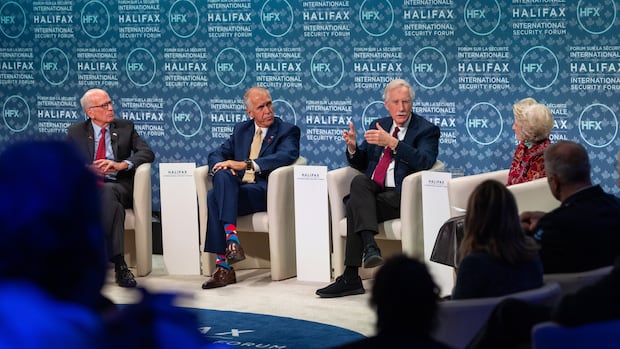Nova ScotiaThe tariffs imposed on Canada by U.S. President Donald Trump have clearly caused economic pain for Canada, but a U.S. senator from Maine says he’s more worried about how Canadians are reacting on a personal level.’But the deeper problem is the cultural break,’ says U.S. senator from MaineMichael MacDonald · The Canadian Press · Posted: Nov 23, 2025 11:01 AM EST | Last Updated: 1 hour agoListen to this articleEstimated 4 minutesThe audio version of this article is generated by text-to-speech, a technology based on artificial intelligence.From left: Sen. Peter Welch of Vermont, Sen. Thom Tillis of North Carolina, Sen. Angus King of Maine and former congresswoman Jane Harman, the moderator, take part in the Halifax International Security Forum. (The Canadian Press)The tariffs imposed on Canada by U.S. President Donald Trump have clearly caused economic pain for Canada, but a U.S. senator from Maine says he’s more worried about how Canadians are reacting on a personal level.”Like any neighbours, there’s always going to be issues back and forth, and we’ve been fighting about softwood lumber for as long as I could remember,” Angus King told an international security conference in Halifax on Saturday.”But the deeper problem is the cultural break; the idea that Canadians don’t think of Americans as their friends and neighbours, but as adversaries.”The annual Halifax International Security Forum that opened Friday has attracted more than 300 delegates from around the world, including politicians, academics, government officials, military leaders and non-government organizations.The focus of this year’s conference is democracy, but questions about Canada-U.S. relations touched off a heated debate on Saturday morning when King and three other American politicians were asked to talk about their country’s place in the world.King, one of only two Independents in the U.S. Senate, said the lingering rift between Canadians and Americans is particularly troubling in a state that borders on New Brunswick and Quebec.”Being from a state where we have people going across the border to get a haircut … it’s a sad day. And if there was some point to it, that would be one thing. But there was no benefit to the United States imposing these ridiculous tariffs.”In response, Republican Sen. Thom Tillis reminded the audience that Canada and the U.S. are part of a broader family of democratic countries that have a long history of squabbles over trade.”I know that if we were under threat, we would come to each others’ aid,” said the outspoken senator from North Carolina.But Tillis quickly pivoted to a harsh critique of what he said was Canada’s failure to meet its financial obligations to NATO, saying Ottawa still owes the military alliance more than $300 billion.”Every prime minister has said the same thing, ‘We’re going to get to it,’ and they never got to it,” said Tillis.”Some look down their noses at the United States because of health care. On the other hand, we’ve met our obligations to funding our mutual defence for as long as NATO has been around.”Former California congresswoman Jane Harman, a Democrat, argued that Canada recently committed to spending more on defence. In June, Prime Minister Mark Carney announced a plan to boost spending by $9 billion by March of next year, bringing defence spending to two per cent of Canada’s GDP.Tillis scoffed at the promise. “That’s lovely, but could we do a makeup for the 20 years of shortfall payments as well?”Republican Sen. Kevin Cramer, who represents North Dakota, said King was right to call attention to the “cultural break” between the two countries.”There’s become a tension,” he said later during a news conference, adding that the strain has led to fewer Canadians travelling to the United States for pleasure.”In North Dakota, that happens to be shopping in the malls and staying in the hotels…. Those numbers are down because people are angry.”Democratic Sen. Jeanne Shaheen of New Hampshire told CBC’s Rosemary Barton Live restarting talks is in the best interests of both countries.Shaheen said tariffs have had a “difficult impact” on the Canadian and American economies. She said the biggest issue she hears from her constituents is the rising cost of living.”The impact of the tariffs on grocery prices, the impact on rent, on electricity prices, on child care,” Shaheen said.”All of them major expenses that families have to pay have increased since Donald Trump took office. And the tariffs are a big piece of that.”Kramer said he was hopeful something could be worked out despite Trump’s recent decision to impose more tariffs on Canadian businesses.”Our relationship with Canadians is very personal,” he said. “The best way to fix this is to get back to the negotiating table and fix whatever it is that separates us on trade…. People in both countries are anxious to reunite.”MORE TOP STORIESWith files from Rosemary Barton Live
‘Cultural break’: U.S. senators say relations with Canadian neighbours are suffering











